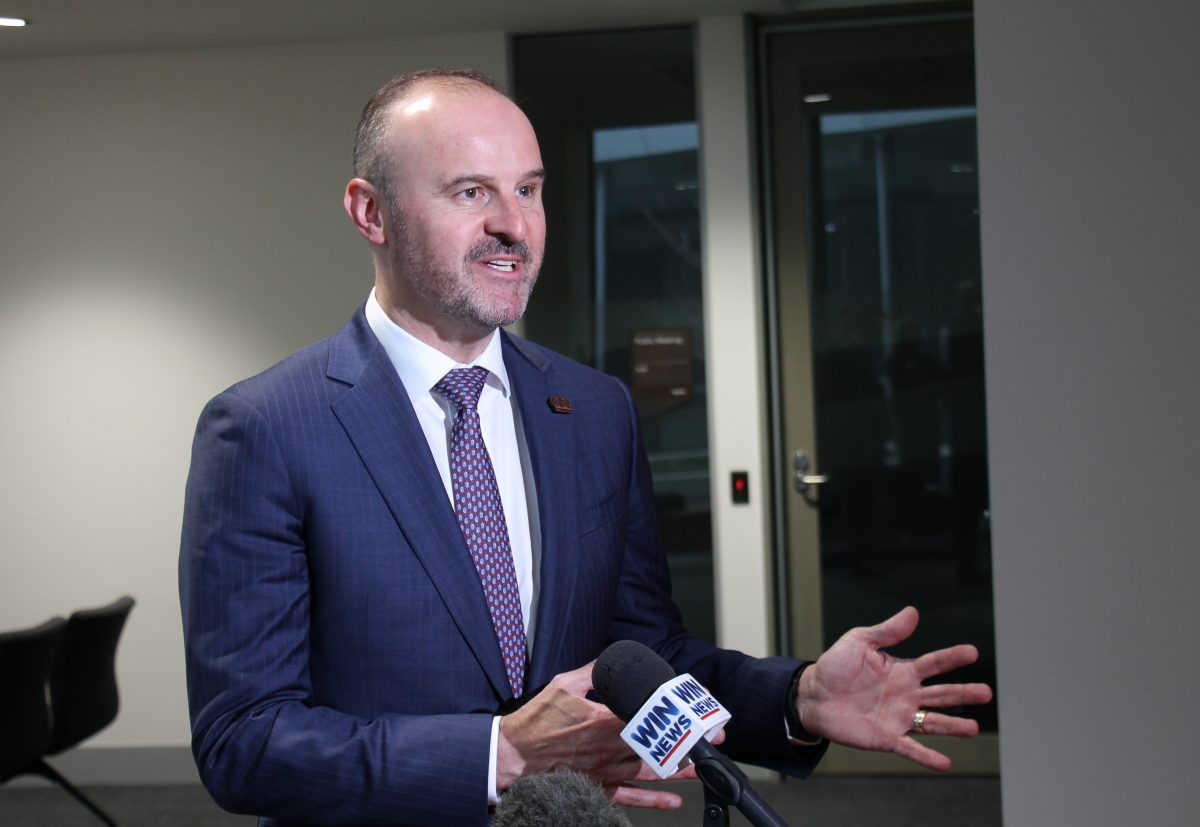
Chief Minister Andrew Barr announced the Drug and Alcohol Sentencing Court would be funded for the next three years in the 2023-24 ACT Budget. Photo: Albert McKnight.
The future of the ACT’s Drug and Alcohol Sentencing Court has been secured for another three years, following a pre-budget announcement for more funding to expand the service.
However, the timing of the announcement has been criticised as not giving enough certainty to the organisations providing the treatment.
Chief Minister Andrew Barr and Attorney-General Shane Rattenbury made the announcement on Thursday (22 June) that $8.4 million will be provided to the Drug and Alcohol Court in the 2023-24 ACT Budget, enabling it to increase its capacity by 20 per cent.
A further $27 million will be provisioned for the next three years as the court continues to be evaluated.
It’s after an independent review of the court last year found it has been reducing re-offending, helping offenders get their lives on track and saving the community money.
“We felt, as a Cabinet, that [the court] was achieving some of the many significant benefits that we’ve wanted … and that the impact has been significant enough to warrant the expansion of the program,” Mr Barr said.
“Merely locking people up for crimes which flow from the misuse of alcohol and drugs does not work to break the cycle. By addressing underlying causes of addiction such as trauma, this court changes people’s lives and reduces crime.”
The money will allow the number of eligible people to be treated in the program to increase from 35 to 42.
The court, Legal Aid, mental health workers, drug and alcohol workers and other therapeutic staff all make up the program, and so the money will be spread across each element.
Mr Rattenbury said the government wanted to make sure the growth of the program was sustainable, which was why the funding would continue to be gradual.
“The particular challenge in the current employment market is actually finding the staff to boost the capacity of this court,” he said.
“This is locking in the long-term future of this court.”
The evaluation estimated the program had saved the community $14 million in avoided prison time, providing another incentive to keep it going.
“[But there’s also] really important human elements, which show the therapeutic justice approach that is being used here is having a significant impact on people who’ve had a strong history of involvement in the criminal justice system,” Mr Rattenbury said.
“The Drug and Alcohol Court has a proven record of helping people in the community break the cycle of offending”
While the funding has been labelled “excellent” and welcomed, the Alcohol Tobacco and Other Drug Association ACT (ATODA) has criticised the government for leaving the announcement so late.
ATODA interim CEO Susan Helyar said the announcement has come just one week before the existing contracts with the treatment services that accept referrals from the Drug and Alcohol Court were meant to end.
“Without timely notification of contract extensions, services are unreasonably required to operate services without a guarantee that funding will be available to pay for that service,” she said.
“Community organisations accept this risk in order to prioritise client outcomes and retain qualified staff.
“ATODA urges the ACT Government to ensure essential community-based services have certainty of funding several months before the planned end date of contracts and orderly transition arrangements if funding is ceasing.”
Ms Heylar said while this problem of having funding announcements so close to the end of the financial year was nothing new from any level of government, having the ACT Budget come out so close to 30 June meant there could be no certainty for services or their staff.
She described it as an “unreasonable risk” to place on services because even if assurances were made that funding was coming in a budget, nothing was clear or concrete.
“The issue [in this case] is that the Drug and Alcohol Court was continuing to refer people [while we were waiting for more funding,” Ms Heylar said.
“That transfers the risk to the service providers who accept someone to come into a four or 12-week program when they haven’t had the bottom line signed to fund the service.”
While an independent review had been conducted into the implementation of the Drug and Alcohol Court, Ms Heylar said there now needed to be a “more thorough” evaluation of the impact of the program itself.
She said questions remained, including if the service was matching demand, what (if anything) was preventing people to be eligible for the community such as having insecure housing, and if the services had room not just to accept people referred from the court, but from the community as well.
Ms Heylar explained they also wanted to make sure the program wasn’t creating a “perverse” incentive that people would get access to services faster if they committed a crime and were then referred through the court.
The ACT Government has also set aside $634,000 over two years to fund a specialist forensic counselling service in the Coroners Court for families going through the process, as well as for the recruitment of a second Family Liaison Officer for the court.
“The new forensic counselling service will provide free support and counselling to loved ones in the immediate aftermath of a death which is being investigated by the Coroner,” Mr Rattenbury said.
“Additionally, the funding of a second Family Liaison Officer will provide support to families involved in coronial matters.”
It’s after a dedicated Coroner for the ACT was appointed last year to address the backlog of cases to be investigated.





















